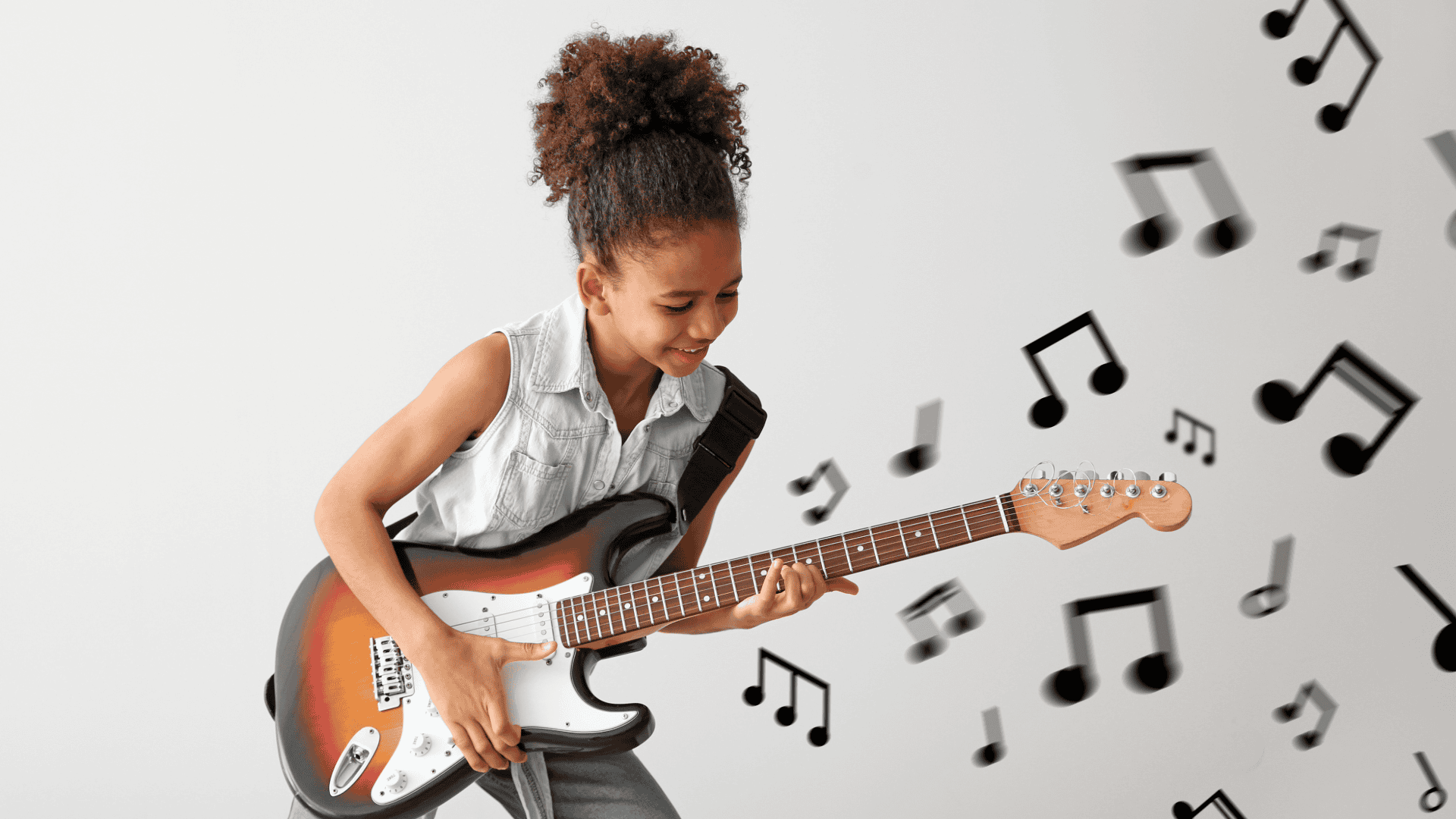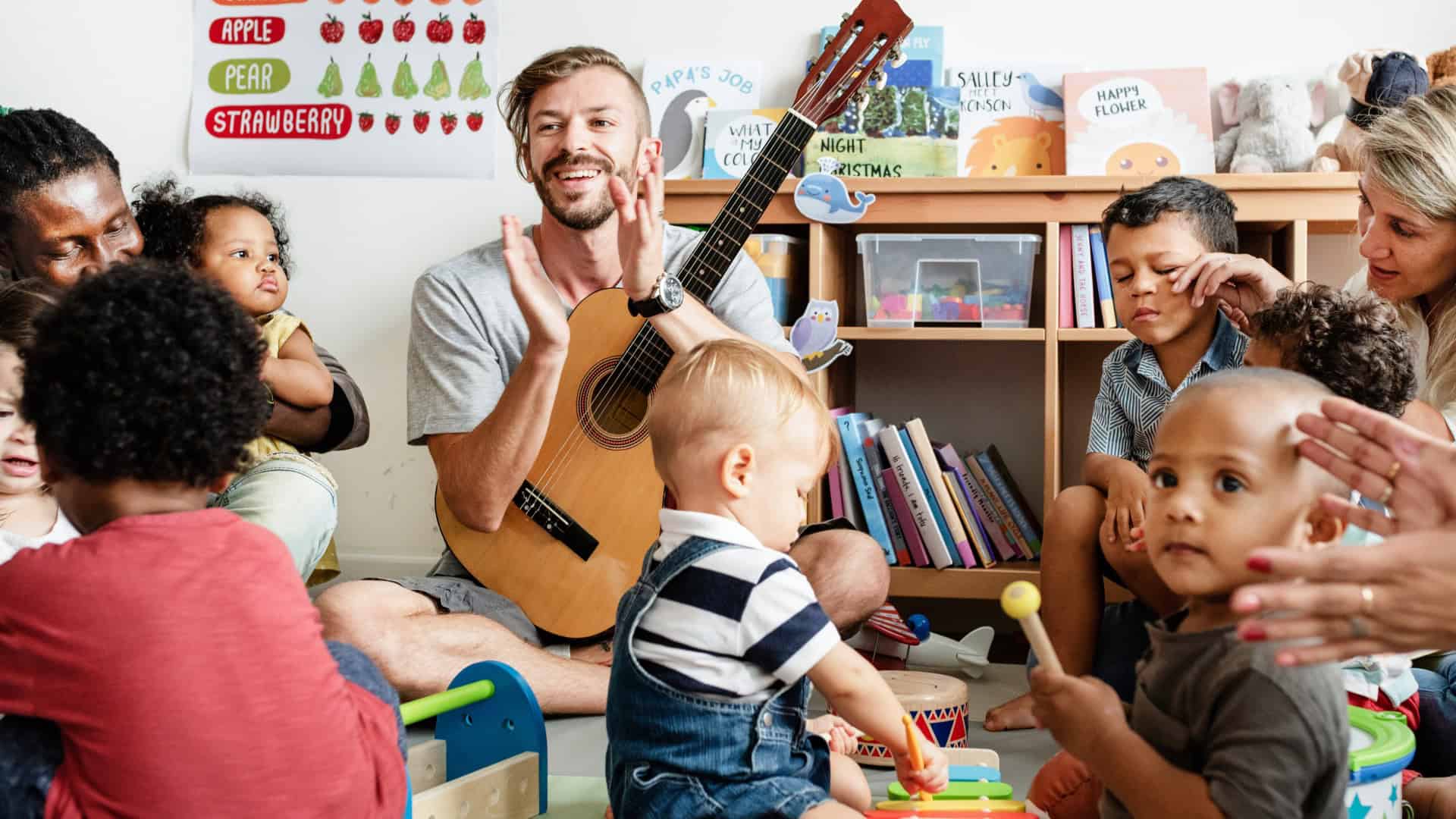What do you do when your kid is enthusiastic about playing a guitar. What about another musical instrument such as piano or violin? Or, (yikes) drums? The are so many benefits of learning music for kids despite the challenges that can arise as a parent.
Very few of us look forward to the prospect of listening to children practice a screechy violin or tunelessly practice the recorder. Nevertheless, once they get a little better, it is intensely satisfying to watch and hear what they have accomplished.
More Benefits of Learning Music for Kids
There are also a number of benefits that are readily apparent for youngsters who study a musical instrument. Not only can it be a relaxing pastime, but it also has the potential to have significant positive implications for the individual’s growth and education.
When playing music, regions of the brain become stimulated. This is why it is an excellent activity for the development of young children. Studies show that playing games at an early age can help a child improve their memory. This also leads to greater self-discipline, self-confidence, and even aid in the development of reading and language abilities.
Music Enhances Learning for Children
Music studies have shown there is a clear correlation between young children participating in music education and better language and reading skills in those youngsters.
As a result, changes occur in the brains of young children as they develop. Young children involved in music education also show a transfer of cognitive skills. These skills spill into other non-musical areas of the brain such as verbal recognition. This is due to the fact that children’s brains are more plastic at a younger age.
Music Enhances Discipline
Children frequently have difficulty maintaining their own self-discipline since it is not in their nature to do so. However, a lack of self-discipline can be detrimental to a child’s schooling as well as other aspects of growth and life.
One of the most effective methods for teaching a youngster the value of self-discipline is to teach them how to play a musical instrument such as pianos.
Proficiency at playing an instrument demands consistent practice. Children who begin at a young age gain fundamental abilities in discipline and attention that will serve them well in many facets of their adult lives.

Emotional intelligence is increased
Arousing certain sensations and states of mind is one of the major functions of musical composition. One of the most important advantages of teaching children to play a musical instrument is that they will get more in touch with their feelings as they play instruments and listen to music.
This is one of the major benefits of learning to play a musical instrument such as the guitar. This leads to increased emotional intelligence, which in turn leads to success in a variety of aspects of their adult lives if the practice is maintained on a regular basis.
Music is beneficial to the development of confidence
Building one’s own self-confidence is among the most essential skills a youngster may acquire. Because it allows them to become skilled at something, music is a great activity for helping kids build their self-confidence.
When youngsters realize they are getting better at something, it typically leads to a boost in their sense of self-esteem. They are encouraged as a result to improve their talents in a variety of different areas.
Music helps Improve Memory
Because learning an instrument engages a variety of cognitive processes, new neural connections are formed, allowing communication across regions of the brain that normally would not be linked.
When you play an instrument, the region of your brain (the left side!) that is responsible for linguistic and mathematical processes makes a connection with the portion of your brain that is responsible for creative and emotional expression (the right side of the brain). Memory formation, storage, and retrieval are all improved as a consequence of this, which is of tremendous help to children in a variety of ways.

List of Benefits of Learning Music for Kids
Children learning music experience a wide range of benefits, which positively impact their cognitive, emotional, and social development. Some of the key benefits include:
1. Cognitive Development
- Enhanced memory and attention: Learning to play an instrument improves memory, attention, and concentration. Children develop the ability to focus on tasks and improve their multitasking skills.
- Better mathematical and language skills: Music involves patterns and structures similar to math and language. This helps children further enhance their understanding of these subjects.
2. Emotional Development
- Emotional expression and regulation: Music provides a creative outlet for children to express their emotions and thoughts. Kids will naturally develop emotional awareness and regulation as a result.
- Boosts self-esteem: Mastering a musical instrument or performance builds confidence and a sense of achievement, leading to improved self-esteem.
- Stress reduction: Music can be soothing and therapeutic, reducing stress and anxiety in children.
3. Social Development
- Teamwork and collaboration: Playing in a group, such as a band or orchestra, fosters teamwork, cooperation, and social skills. As a result, children learn to work together to create music.
- Enhanced communication skills: Music helps children develop better listening skills and empathy. Kids also gain the ability to communicate non-verbally through expression and rhythm.
4. Motor Skills and Coordination
- Fine motor skills: Playing an instrument requires precise hand movements and coordination, improving motor skills and hand-eye coordination.
- Physical coordination: Drumming, dancing, or playing instruments like the piano and guitar enhances a child’s overall coordination and dexterity.

5. Cultural Awareness
- Exposure to different cultures: Introducing kids to music exposes them to various cultures and traditions. Further broadening their understanding of the world and fostering cultural appreciation is a good thing.
Learning Music for Kids
6. Creativity and Imagination
- Encourages creative thinking: Nurturing creativity through music, allows children to experiment with sounds, melodies, and rhythms. The by-product of this is enhancing their imagination and creative problem-solving abilities.
7. Discipline and Patience
- Develops perseverance: Learning music requires dedication, practice, and patience, helping children develop discipline and persistence as they strive to improve their skills.
8. Academic Performance
- Studies show that children involved in music education often perform better academically, as the skills developed through learning music—like focus, memory, and discipline—translate into other areas of their education.
Benefits of Learning Music for Kids Final Thoughts
Overall, music education supports a child’s holistic development, enriching their intellectual, emotional, and social capacities. Learning music for kids has many benefits!
Craig Smith is a professional Guitarist, Teacher, and Writer living in Sanford, Florida. Craig has taught guitar lessons, performed 200+ gigs per year for nearly 30 years, and published 4 guitar instructional books. When he’s not gigging or writing, you may find him by the pool with his wife Celeste, 4 Chihuahuas, and a drink. 🎸


